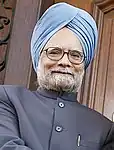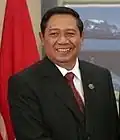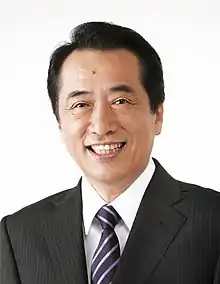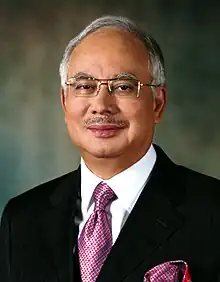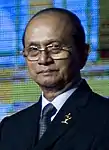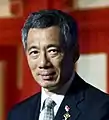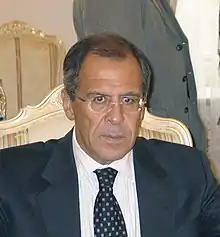Fifth East Asia Summit
The Fifth East Asia Summit was held in Hanoi, Vietnam on October 28-31, 2010. The East Asia Summit (EAS) is a pan-Asia forum held annually by the leaders of 16 countries in the East Asian region. EAS meetings are held after annual ASEAN leaders' meetings. The participants issued a Chairman's Statement called the Hanoi Declaration commemorating the fifth anniversary of the EAS and summarizing the summit's discussion.[1]
| Fifth East Asia Summit | |
|---|---|
| Host country | Vietnam |
| Date | October 28–31, 2010 |
| Cities | Hanoi |
| Participants | EAS members |
| Follows | Fourth East Asia Summit |
| Precedes | Sixth East Asia Summit |
Attending delegations
The 16 countries participating at the head of state and head of government level were:
Attending the summit also this year were representatives from Russia[2][3][4] and the United States[5][6]
The United States and Russia attended the 2010 EAS as ‘Guests of the Host’ with formal entry at the head of state and head of government level scheduled for 2011.
The status of potential future members for the EAS was discussed in the Chairman's Statement of the 16th ASEAN Summit (9 April 2010)[7] in these terms:
43. We recognized and supported the mutually reinforcing roles of the ASEAN+3 process, the East Asia Summit (EAS), and such regional forums as the ASEAN Regional Forum (ARF), to promote the East Asian cooperation and dialogue towards the building of a community in East Asia. In this connection, we encouraged Russia and the US to deepen their engagement in an evolving regional architecture, including the possibility of their involvement with the EAS through appropriate modalities, taking into account the Leaders-led, open and inclusive nature of the EAS.
Agenda
The leaders exchanged views on regional and international issues and on the future cooperation in EAS.
East Asia Joint Research Fund
Japan has proposed a joint fund between the summit members to support science and technology.[8]
Enhancing regional financial cooperation and coordination
A draft of the Chairman's statement called for the members to enhance regional financial cooperation and coordination in the face of the current fragile world economic recovery, but did not provide details of what this would involve.[9]
Education
China has made reference to deepening educational exchanges through the Summit.[10]
Issues identified by India
India identified the following issues for the summit:[11][12]
- Energy, Environment, climate change and sustainable development
- Financial Cooperation
- Pandemics
- Natural Disaster Mitigation
- Education
- Comprehensive Economic Partnership for East Asia (CEPEA) and Economic Research Institute for ASEAN and East Asia (ERIA)
India will also brief the Summit on the Nalanda International University Project.[13]
Outcomes
The Summit issued the Ha Noi Declaration on the commemoration of the fifth anniversary of the East Asia summit.[14] This confirmed the invitation to the United States of America and Russia.
References
- "Chairman's Statement of the East Asia Summit (EAS)". ASEAN. 30 October 2010.
- Vietnam vows to build stronger ASEAN community Archived 2011-10-06 at archive.today
- An anxious Japan rethinks its future role in Asean Archived 2010-08-24 at the Wayback Machine
- http://interfax.com/newsinf.asp?id=198091 Archived 2011-07-13 at the Wayback Machine Lavrov to attend East Asia Summit in Hanoi
- Clinton to attend East Asia Summit in Hanoi
- State Department steps up its Southeast Asia engagement
- Chairman’s Statement of the 16th ASEAN Summit “Towards the Asean Community: from Vision to Action"
- Japan to propose science research fund at East Asia Summit
- Asian leaders to call for tighter finance cooperation: Draft
- China hopes to deepen East Asian cooperation through leaders' meetings in Hanoi Archived 2012-11-07 at the Wayback Machine
- India - Statement by FS on PM’s visit to Japan, Malaysia and Vietnam
- Prime Minister to embark on three-nation Asia tour on Sunday
- http://www.thaindian.com/newsportal/uncategorized/pm-heads-east-this-sunday-to-bolster-economic-ties_100448327.html
- Ha Noi Declaration on the commemoration of the fifth anniversary of the EAST ASIA summit Archived November 3, 2010, at the Wayback Machine

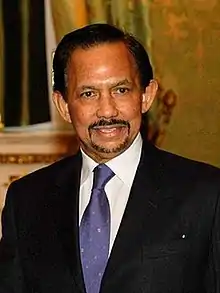
_cropped.jpg.webp)

